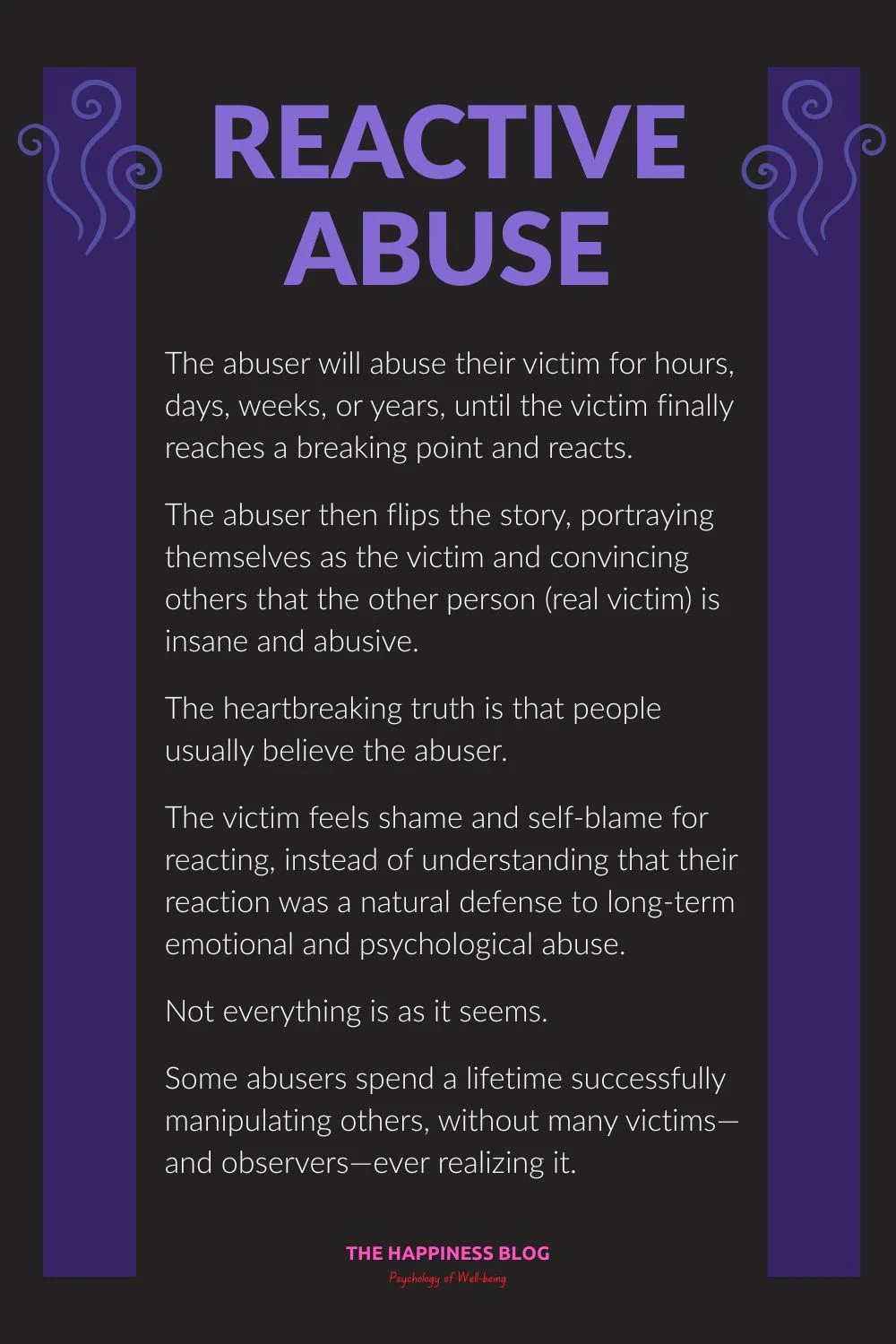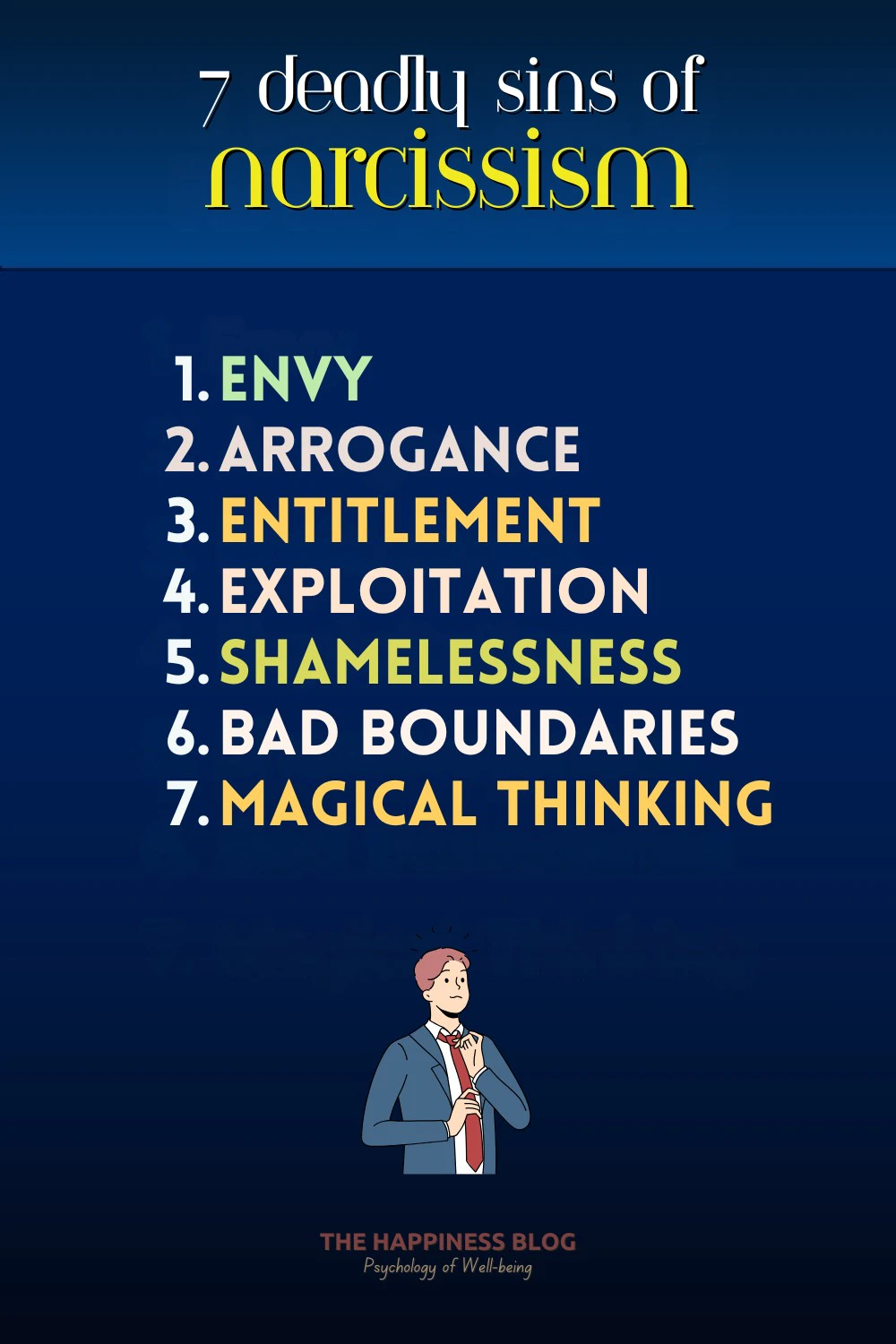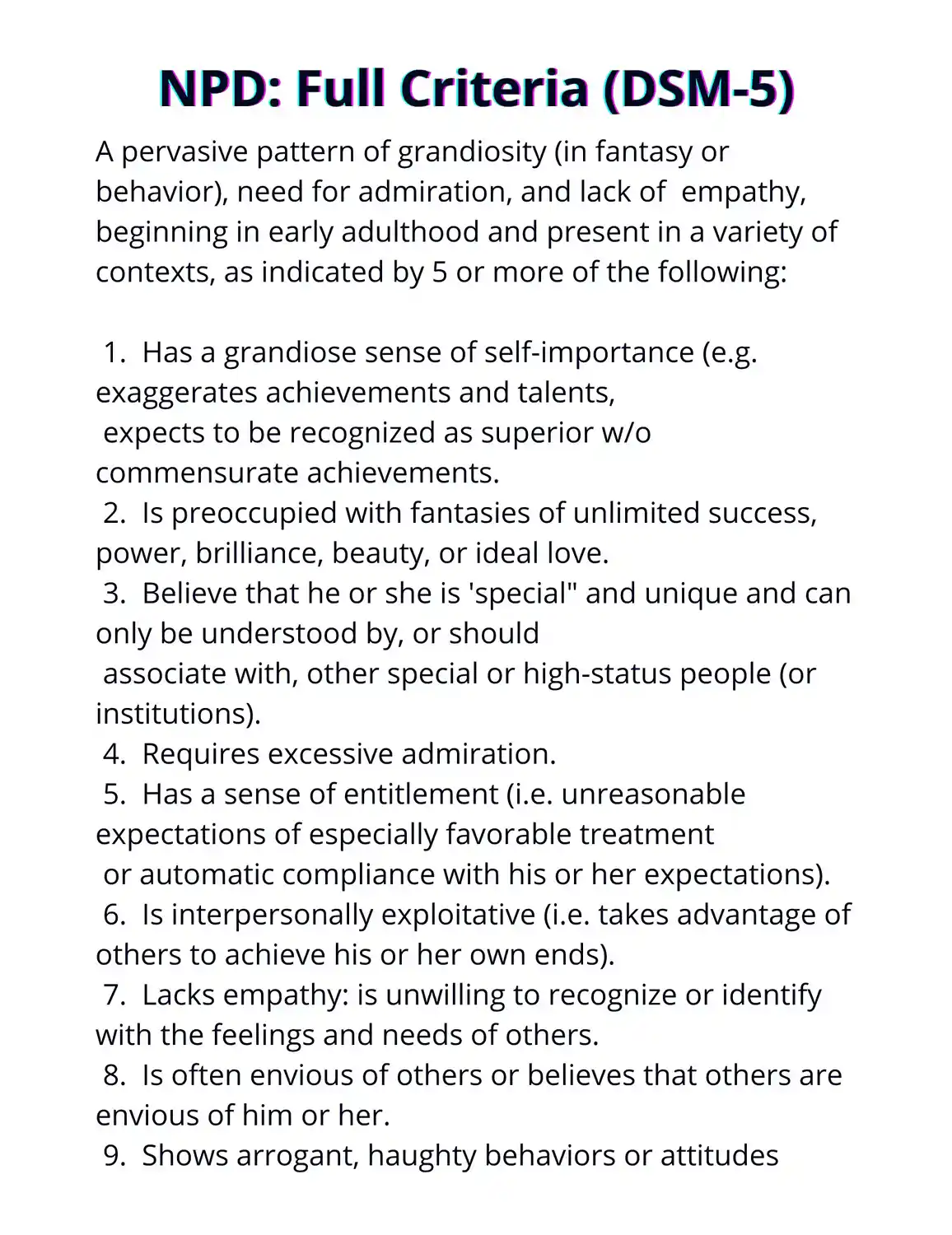Today's Thursday • 20 mins read
— By Dr. Sandip Roy.
Of the many psychological traits associated with narcissists, three lie at the center:
- an inflated sense of self-importance,
- a persistent need for admiration, and
- a lack of emotional empathy toward others.
Some of them are grandiose narcissists, the extreme ones who brag arrogantly, act like gods, and dismiss other people like they don’t matter. They are relatively easy to spot.
And then, there are the hidden, vulnerable narcissists. These less extreme types are also called covert narcissists, and their types do some weird things.
Whatever their type, narcissists always find time to worship their larger-than-life self-image. Self-worship makes them feel better, especially when others stop valuing them.
Glorifying themselves and demeaning others serves as their psychological defense against intolerable feelings of inadequacy, failure, and insignificance.
There’s more; read on.
20 Traits of A Narcissist: Narcissistic Behavior Red Flags
Twenty Signs of A Narcissist
1. Exploitation of Others
A core pattern in narcissism is using people for personal gain. Some say narcissists don’t know otherwise.
It’s their nature to approach relationships as give-and-take transactions, not mutual bonds.
They think what others give or do for them is what they are entitled to. But any effort of theirs, they frame it as a favor that demands gratitude or payback.
2. Bullying Behavior
Narcissists often target people they perceive as weaker or less protected
Narcissists are often bullies who target people they perceive as weaker or vulnerable. Their hostility may include insults, intimidation, or public humiliation.
However, their hostile behavior is selective. This hostility disappears around those who hold power. This duality reveals a mix of dominance-seeking and self-protection.
So, narcissists are sycophantic and obsequious to powerful narcissists, but bullies to gentle people.
3. Disrespect for Boundaries
Narcissists have an inherent disregard for emotional, physical, and moral boundaries.
They treat others’ limits as negotiable if they interfere with what they want. They almost believe it is their right to walk into other people’s personal space without permission.
Intrusion is often a way to test how much others can take before reacting. This is called reactive abuse.

4. Need for Control
Control plays a central role in narcissistic behavior.
Narcissists micromanage their surroundings and relationships. They want the final say in decisions, conversations, and outcomes, often in a rigid, dictatorial way.
This need for control stems from fragile self-esteem that seeks stability through dominance.
When others challenge or ignore their opinions, they grow anxious that control is slipping. To regain it, they often turn to anger, pressure, or manipulation.
5. Strong Sense of Entitlement
Narcissists, by nature, have a strong sense of entitlement.
Entitlement means believing one deserves special treatment or recognition, even when one has not done anything to earn it.
They believe they must be given extraordinary treatment, attention, and compliance.
Rules feel optional when those rules limit what they want. They expect others to adjust, accommodate, and prioritize their needs without question.
When their expectations are not met, they see it as disrespect or injustice. This quickly turns into resentment, pressure, or punishment toward the person who failed to serve their entitlement.
6. Lack of Empathy
Narcissists are emotionally detached. They lack genuine emotional empathy.
Your narcissist may understand what you feel on an intellectual level, but they do not emotionally register your pain in a way that restrains their hurtful behavior.
They may appear caring or concerned when it benefits their image or helps them avoid consequences. But when their actions cause harm, they feel little true remorse or guilt.
Empathy fades quickly when it conflicts with their needs, control, or self-image.
7. Belief in Superiority
Narcissists hold a deep belief that they are inherently superior to others.
They see themselves as more intelligent, refined, deserving, or morally elevated than the people around them. This belief shapes how they judge others and decide who deserves respect and who does not.
Their sense of superiority does not depend on outcomes or evidence. When life fails to reflect this ranking, they blame others for being blind, unfair, or incapable of recognizing their worth.
Over time, this often hardens into resentment toward all. In fact, a common old-age narcissistic regret is that the world did not value their supposed talent and greatness.
8. Inflated Sense of Self-Importance
Narcissists have an exaggerated sense of how important they are in any setting.
They expect their opinions to carry extra weight and their presence to command attention. They often talk about their achievements, exaggerate their role, and assume they should be prioritized.
Being overlooked feels threatening to them. Disagreement, lack of recognition, or being treated as ordinary can quickly provoke defensiveness, irritation, or anger.
Research shows narcissists do not equally desire all forms of fame and express a desire for fame only when it feels attainable (Giacomin & Battaglini, 2018). This suggests they seek recognition that confirms their importance, rather than attention that carries risks of failure or exposure.
9. Overestimation of Abilities
Narcissists routinely overestimate their abilities and competence.
They believe they are more skilled, insightful, or capable than they truly are. Confidence replaces preparation, and self-reflection feels unnecessary.
When reality exposes gaps between belief and performance, they deny failure or shift blame. Admitting limitations feels too destabilizing to their self-image.
Almost all of narcissistic self-belief is an overestimation.
10. Condescending Attitude
Narcissists carry a condescending attitude, as if they are looking at you from a higher plane.
Their tone, expressions, and remarks carry subtle or open contempt. They talk down, dismiss opinions, and treat others as less informed or less important.
This condescension helps them maintain a sense of dominance. Putting others down reassures them that they remain above scrutiny or challenge.
Narcissists inferiorize others to elevate themselves.

11. Arrogance and Hostility
Narcissists respond to disagreement with arrogance and hostility.
They approach conflict as a threat rather than a conversation. Challenges to their views are taken personally and often met with aggression, sarcasm, or intimidation.
Admitting fault feels intolerable to them. Hostility becomes a way to protect their ego and shut down further challenge.
12. Denial of Responsibility
Almost always, narcissists refuse to take responsibility whenever their actions lead to negative outcomes.
Their default is to deflect blame, rewrite events, or accuse others of causing the problem. Accountability feels dangerous because it exposes flaws they cannot tolerate.
Even with clear evidence, such as when they are caught cheating or lying, they will reject ownership. For them, preserving their self-image matters more than honesty or repair.
13. Predatory Relationship Patterns
Narcissists approach relationships with a focus on control, benefit, and supply.
Narcissists are known to link with influential people to enhance their self-image and status.
They value people for what they provide, whether attention, status, loyalty, or emotional labor. Partners and family members are expected to serve these needs consistently.
When usefulness declines, warmth fades. Relationships are often discarded rather than repaired.
14. Superficial Emotional Bonds
Narcissists form relationships that lack emotional depth.
They may appear socially engaged, but true emotional intimacy feels uncomfortable or unnecessary to them. They avoid sharing their vulnerability for fear of being exploited.
Those close to a narcissist often feel emotionally drained, unseen, and replaceable, even when the relationship appears functional on the surface.
15. Fragile Self-Esteem
Despite their outward confidence, narcissists have fragile self-esteem.
Their sense of worth depends heavily on validation, admiration, and reassurance from others. Without it, they quickly feel exposed or diminished.
This fragility drives many of their behaviors, including control, defensiveness, and hostility when their image is threatened.
16. Sensitivity to Criticism
Narcissists are highly sensitive to criticism.
Even mild feedback can feel like an insult on their person. So they react defensively, dismissively, or with anger to any critique.
This sensitivity exists because criticism threatens to puncture their inflated self-image they rely on to feel stable. Even in private, they would rather grumble about the feedback than reflect on it.
17. Self-Centeredness
Narcissists place themselves at the center of most situations. They come first, every time.
Their interactions and decisions revolve around their needs, feelings, and preferences. Other people’s perspectives matter only when they align with what the narcissist wants.
Their self-centeredness blinds them to the impact of their actions on others. Over time, this leaves others feeling invisible or emotionally neglected.
18. Attention-Seeking Behavior
Narcissists crave attention and admiration.
They often redirect conversations toward themselves, highlight their achievements, or dramatize experiences to stay in the spotlight. Being seen and noticed helps regulate their self-esteem.
When attention fades, they may escalate their behavior to regain it.
19. Magical Thinking & Reality Distortion
Narcissists often distort reality to protect their self-image. They live in a fantasy world created by self-deception and magical thinking.
They rewrite actual events, deny past statements, or selectively remember facts in ways that favor them. This distortion helps them avoid confronting mistakes or limitations.
It also feeds their grandiosity, letting them avoid the painful truth of facing their “averageness.”
Over time, this creates confusion and self-doubt in those around them.
20. Envy and Projection
Narcissists frequently struggle with envy.
Rather than acknowledging it, they project these feelings onto others, accusing them of jealousy or hostility. This allows them to avoid facing their own insecurity.
Narcissistic projection serves as a psychological defense that protects their fragile self-esteem.
7 Sins of Narcissism

Clinical social worker and psychotherapist Sandy Hotchkiss marks these out in her groundbreaking book on narcissism, Why Is It Always About You?: The Seven Sins of Narcissism.
- Envy. Narcissists constantly compare themselves to others. They feel personally threatened by other people’s success. Their envy often turns quiet resentment into subtle sabotage, dismissal, or devaluation.
- Arrogance. Arrogance is their armor. It protects their fragile sense of worth by projecting superiority and certainty. Beneath the grand presentation sits a chronic fear of being exposed as ordinary or less than that.
- Entitlement. Narcissists expect automatic special treatment. Rules apply to others, while exceptions apply to them. When entitlement goes unmet, irritation quickly escalates into anger or contempt.
- Exploitation. Relationships are their tools to draw supply or enhance self-image. They value people for what they provide, whether attention, status, or emotional labor. Once usefulness declines, their warmth and concern fade.
- Shamelessness. Narcissists often seem shameless and unbothered about violating social or personal boundaries. Yet beneath this surface lies intense shame sensitivity. When their self-esteem is injured, they may erupt in rage and offload their shame onto others through blame and projection.
- Bad Boundaries. They struggle to recognize or respect other people’s personal space and choices. They intrude, control, or withdraw without warning. Other people’s needs feel irrelevant unless they serve the narcissist’s self-image.
- Magical Thinking. Narcissists create fantasies to protect their self-esteem. They tend to romanticize their lives, casting themselves and select others in idealized roles. This inner narrative shields them from feelings of inadequacy, failure, or limitation. Many are drawn to belief systems that promise success, fame, or validation without sustained effort, such as certain forms of pseudoscience or manifestation thinking. When reality contradicts these fantasies, they dismiss the evidence or construct new explanations to preserve the illusion.
How To Spot A Covert Narcissist?
While grandiose narcissists openly brag, you would likely notice these in a covert narcissist:
- They often humblebrag.
- They tend to fish for compliments or validation.
- They bring up their achievements when you share your wins with them.
- This person becomes restless or sulky if they don’t receive attention, praise, or special treatment.
- They are quick to go on the defensive when their ideas, opinions, or actions get criticized or challenged.
A Narcissist’s Language
Can you tell a narcissist from their language? This study suggests you can, as highly narcissistic people tend to:
- Use more words overall.
- Use more swear words (e.g., “damn”).
- Frequently employ auxiliary verbs (e.g., “will”).
- Show less agreement in their speech.
- Use more aggressive and disagreeable words, leading to poorer quality relationships with others.
It is not difficult to spot a grandiose narcissist in a group; they often exude an attitude of superiority and boast about their accomplishments, qualities, or possessions in a crowd-pleasing way.
In contrast, some psychopathic narcissists may give you a chilling, unblinking stare from a distance, known as the sociopathic stare, which signals that they want you under total control.
Is Donald Trump A Narcissist?
When NYT’s Maureen Dowd and Patrick Healy talked about Donald Trump’s approach to power during his second term, they made comments on his narcissistic traits:

- Need for Admiration: Maureen Dowd says Trump seeks worship rather than approval. She notes that the language at the convention and inauguration framed him as “a divine creature,” reflecting his long-standing desire to be revered, especially by elites whose respect he still craves.
- Desire for Control and Power: Dowd contrasts Trump’s first term, when he was often dismissed, with his current posture of dominance, calling him “a master and commander of the entire fleet.” Patrick Healy adds that Trump’s hunger to be worshiped is closely tied to how he understands power.
- Self-Centered Leadership Style: Dowd describes Trump’s governing approach as “monomaniacal.” She says he has “subsumed the idea of governing with his personality,” reducing leadership to impulse, self-focus, and personal desire rather than institutional norms.
- Narcissistic Outburst: Dowd warns that giving extreme narcissists unlimited attention can unleash unchecked behavior. “The one thing you really don’t want to do with extreme narcissists is give them everything they want,” she says, as it invites a narcissistic outburst of exceptional force.
- Lack of Empathy: Dowd compares Trump’s administration to the Greek gods, describing it as cruel, capricious, and self-serving. Decisions often appear detached from human consequences, driven more by narcissistic impulse than concern for others.
- Vindictiveness and Resentment: Trump is described as deeply sensitive to slights. He “never forgets a slight,” holding grudges and seeking revenge against critics or those he sees as disloyal, turning challenges into personal scores to settle.
- Manipulation of Fear: Patrick Healy says Trump has played effectively on public fear, especially around the economy and immigration, as a tool to command attention and control.
Why do narcissists believe they are larger than life?

Narcissists perceive and maintain a belief in a larger-than-life image of themselves because:
- They create and become obsessed with a godlike, perfect version of themselves. This self-worship serves as a compensation for their deep-seated feelings of insecurity, inadequacy, and low self-worth.
- The grandiose persona they project acts as a defense mechanism, a fragile facade designed to conceal their profound shame, self-loathing, and fears of being unlovable or ordinary.
- Their narcissistic traits (entitlement, lack of empathy, and need for excessive admiration) stem from an underlying sense of emptiness and a desperate attempt to construct an idealized self-image to protect their fragile egos.
- Beneath the arrogant, self-absorbed exterior lies a tormented individual, haunted by feelings of inferiority and intense envy of others.
- Their relentless pursuit of narcissistic supply (attention, power, and status) is a futile attempt to fill the void within, a black hole of insecurity that can never be satisfied.
- The more they strive to convince the world of their superiority and uniqueness, the more they reveal their tragic inability to love and accept their true, flawed selves.
Deep down, narcissists know how embarrassingly average and unspecial they are.
Researchers support it:
- Back and colleagues (2013) note that narcissists use self-enhancement or self-protection strategies to sustain the grandiose self, in their narcissistic admiration and rivalry concept (NARC).
- Morf and Rhodewalt (2001) explain Narcissism as the dynamic process of creating and maintaining a grandiose self.

How is narcissism diagnosed?
The DSM-5 requires a person to have at least five of the following to be diagnosed as Narcissistic Personality Disorder (NPD):

- A grandiose sense of entitlement, that is, exaggerates achievements and talents, and expects to be recognized as superior without commensurate achievements.
- A preoccupation with fantasies of unlimited success, power, brilliance, beauty, or ideal love.
- A belief that they are special and unique, and can only be understood by, or should associate with, other special or high-status people.
- A need for excessive admiration.
- A sense of entitlement, that is, unreasonable expectations of especially favorable treatment or automatic compliance with their expectations.
- Interpersonally exploitative behavior. They are someone who takes advantage of others to achieve their own ends.
- A lack of empathy, that is, a person who is unwilling to recognize or identify with the feelings and needs of others
- Envy of others or a belief that others are envious of him/her.
- A show of arrogant and haughty behaviors or attitudes.
NPD can only be diagnosed by a qualified mental health clinician.
NPD is a part of Cluster B personality (disorders marked by inappropriate and volatile emotionality, unpredictable behavior, and struggle to maintain relationships). Cluster B personality disorders:
- Antisocial personality disorder (ASPD)
- Borderline personality disorder (BPD)
- Narcissistic Personality Disorder (NPD)
- Histrionic personality disorder (HPD)
How many types of narcissists are there?
Many experts feel that narcissists can be of six types. Two main types are:
- Grandiose narcissists. Highly self-centered. Use a lot of “I, me, mine” statements. The Narcissistic Personality Inventory (NPI) measures grandiose narcissism by asking subjects if they agree with statements like, “I am a special person” or “I am more capable than other people.” (Raskin & Terry, 1988).
- Vulnerable narcissists. Also called covert narcissists. Usually keep their self-centeredness “hidden.” Their vulnerability is often associated with various personal and social problems (Kaufman et al., 2020; Miller et al., 2011).
How common is NPD?
NPD affects about 1 in 200 people.
- NPD has a global lifetime prevalence of 6.2%.
- NPD affects around 0.5 percent of US adults.
- 75% of those diagnosed with NPD are men.
- Narcissism appears in the early-20s to mid-20s.
- Once it sets in, it is typically lifelong and may get worse in middle or old age unless treated.
- Positive life events, such as new achievements, secure relationships, and manageable setbacks, can lead to a significant reduction in pathological narcissism over time (Ronningstam et al., 1995).
Narcissism In Children & Adolescents
Narcissism is moderately heritable (Vernon & Villani, 2008).
- Children are born with narcissistic tendencies. Babies mostly do things to get food and love.
- Narcissistic tendencies usually fade as children grow up. However, some children may become more narcissistic during adolescence.
A 2015 study found that narcissism levels have been increasing among Western youth and contributing to societal problems such as hostile behavior.
This study found that narcissism type was predicted by specific parenting styles:
- Parental overprotection (“helicopter parenting”) and parental overvaluation were associated with greater grandiose narcissism.
- Parental leniency was associated with more vulnerable narcissism.
The children seem to partly acquire narcissism by internalizing parents’ inflated views of them (e.g., “I am superior to others” and “I am entitled to privileges”).
High narcissism in young people can also contribute to depression, anxiety, low self-worth, self-harm attempts, and poor-quality relationships (Narcissistic traits in young people, 2020).
History of Narcissism
- The concept of narcissism can be traced to the Greek myth of Narcissus.
- When the egoistic hunter Narcissus rejects Echo’s love, the Gods condemn him to fall in love with his own reflection. He sees his image in the water, but each time he tries to touch it, the waves would make it disappear. He withers away, transfixed, longing for his unreachable self-image.
- Psychologists came to identify the traits of Narcissus as narcissism. In 1898, Havelock Ellis, a British medical doctor, was the first to classify narcissism as a mental disorder.
- Sigmund Freud wrote a famous essay on narcissism in 1914: On Narcissism. He suggested narcissism was a normal stage in child development, but becomes a disorder when it occurs after puberty.
NPD vs. NPT
NPT is a milder form of NPD.
| Aspect | Narcissistic Personality Disorder (NPD) | Narcissistic Personality Traits (NPT) |
|---|---|---|
| Definition | A mental health diagnosis with pervasive traits impairing social, occupational, or other functioning areas. | Self-centeredness, need for praise, and lack of empathy, not severe enough to impair daily functioning. |
| Severity | Severe, with a noticeably negative impact on daily life and relationships. | Mild to moderate, does not typically affect daily functions or relationships significantly. |
| Diagnosis | Requires clinical evaluation and meets criteria in DSM-5 or ICD-10. | No formal diagnosis; traits are present but not at a clinical level. |
| Impact on Life | Causes substantial difficulties in social, occupational, and other important areas. | May cause occasional interpersonal issues, but generally manageable. |
| Behavioral Patterns | Persistent grandiosity, excessive need for admiration, and profound lack of empathy. | May exhibit self-centered behavior and desire for admiration without the pervasive impact. |
| Empathy | Marked lack of empathy; difficulty recognizing or caring about others’ needs and feelings. | Reduced empathy but still capable of recognizing others’ needs and feelings to some extent. |
| Functioning | Often struggles to maintain healthy relationships and stable job performance. | Generally maintains functional relationships and job performance. |
| Treatment | Management often requires psychotherapy and sometimes medication. | Traits can be managed with self-awareness, personal development, and sometimes counseling. |
| Recognition of Issue | Often lacks insight into their condition; resistant to acknowledging the disorder. | May recognize their self-centered behavior and its impact, more open to self-improvement. |
Books on Narcissism
- Narcissism: Living in the Age of Entitlement (2009) by Twenge & Campbell
- Disarming the Narcissist: Surviving and Thriving with the Self-Absorbed (2014) by Wendy Behary
- The Narcissist Next Door: Understanding the Monster in Your Family, in Your Office (2014) by Kluger
- Should I Stay or Should I Go?: Surviving a Relationship with a Narcissist (2015) by Ramani Durvasula
- The Narcissist You Know: Defending Yourself Against Extreme Narcissists (2017) by Joseph Burgo
- The Narcissist’s Playbook: How to Identify, Disarm, and Protect Yourself (2019) by Dana Morningstar
- The Narcissist in Your Life: Recognizing the Patterns and Learning to Break Free (2019) by Julie Hall
- Narcissistic Mothers: How to Handle a Narcissistic Parent and Recover from CPTSD (2020) by Foster
Research On Narcissism
- The Dark Side of Leader Narcissism: The Relationship Between Leaders’ Narcissistic Rivalry and Abusive Supervision. Gauglitz & Schyns, 2022.
- Narcissism Today: What We Know and What We Need to Learn. Current Directions in Psychological Science. Miller & Back, 2021.
- The link between narcissism and hostile behavior: A meta-analytic review. Kjærvik & Bushman, 2021.
- Factors influencing TikTok engagement behaviors in China: An examination of gratifications sought, narcissism, and the Big Five personality traits. Meng & Leung, 2021.
- Making CEO Narcissism Research Great: A Review and Meta-Analysis of CEO Narcissism. Cragun & Olsen, 2020.
- Collective Narcissism and Its Social Consequences: The Bad and the Ugly. de Zavala & Lantos, 2020.
- The “Why” and “How” of Narcissism: A Process Model of Narcissistic Status Pursuit. Grapsas & Brummelman, 2020.
- Narcissism and problematic social media use: A systematic literature review. Casale & Banchi, 2020.
- Raising Children With High Self‐Esteem (But Not Narcissism). Brummelman & Sedikides, 2020.
- Clinical Correlates of Vulnerable and Grandiose Narcissism: A Personality Perspective. Kaufman & B., Weiss, 2018.
Final Words
Did you know that narcissists think they are more popular than their peers, but research shows they are actually less popular? Even if they initially get popularity, they eventually lose their status.
“Narcissists want positive feedback about themselves, and they actively manipulate others to solicit or coerce admiration from them. Accordingly, narcissism is thought to reflect a form of chronic interpersonal self-esteem regulation.” — Encyclopedia Britannica
Narcissism is a prevalent personality disorder, and yet many of us don’t know how to cope with these controlling, egotistical people who are incapable of the fundamental give-and-take that sustains healthy relationships.
√ Also Read: How To Heal From Narcissistic Abuse: 10 Evidence-Based Recovery Steps
√ Please share this with someone.
» You deserve happiness! Choosing therapy could be your best decision.
...
• Disclosure: Buying via our links earns us a small commission.

